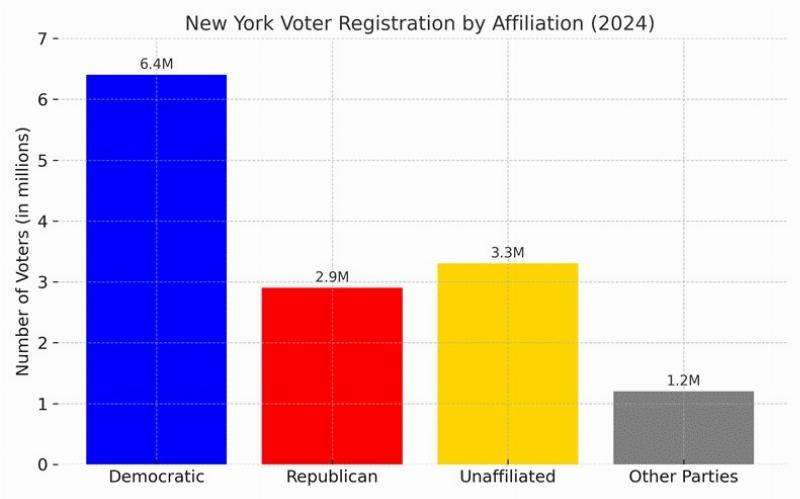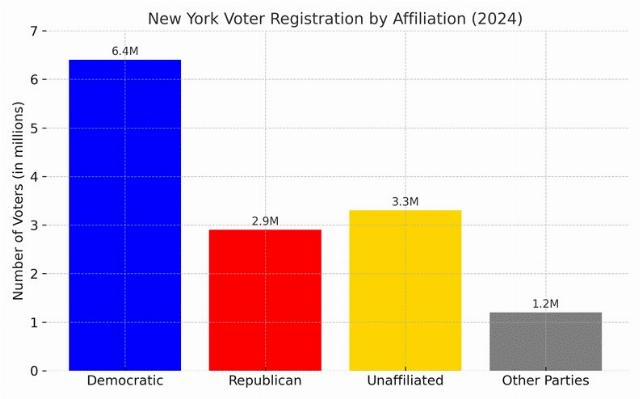


The United States was not founded on a system of entrenched political parties. The Founders explicitly warned against them. Yet today, citizens are forced into a party-dominated system -- just to vote, run for office, or even observe the process that governs them.
George Washington, in his Farewell Address of 1796, cautioned against "the continual mischiefs of the spirit of party." James Madison, in Federalist No. 10, warned that factions -- especially those based on party or economic interest -- would promote division and undermine the public good.
Political parties are private entities. They select and fund candidates aligned with their platforms, enforce loyalty, and exclude those who don’t conform -- yet they dominate publicly funded elections.
As one New York voter put it: “I pay high taxes like everyone else, but I couldn’t vote in the primary because I’m not a registered party member. That’s not democracy.”
Millions of Americans -- especially independents -- help fund our elections but are locked out of the process, bound by rules they didn’t create, muzzled in primaries, and held hostage by private interests that have made themselves gatekeepers. New York State registration data shows a clear shift: unaffiliated voters (over 3.3 million) and Republicans (about 3 million) each make up roughly one-quarter of the electorate, while Democrats account for just under half. As shown in the accompanying graph, these voters are excluded from closed primaries despite each group representing a significant portion of registered voters.

Source: NYS Board of Elections
Over 30% of voters (unaffiliated and minor parties) are excluded from closed primaries.
Early American elections focused on individual merit. Ballots lacked party labels, and voters chose candidates based on service and character. Nonpartisan elections were common for local and judicial offices, and the Progressive Era sought to expand this approach.
The U.S. Constitution does not mention political parties. It grants states power to regulate elections (Article I, Section 4) but does not require affiliation to vote. Moreover, the First and Fourteenth Amendments protect both the freedom of association and the freedom from compelled association, as well as the right to equal protection under the law. Legal scholars argue that excluding unaffiliated voters from taxpayer-funded primaries may violate these protections.
Over time, the two major parties embedded themselves in election law. They control access to ballots, primary elections, and election boards. In states like New York, commissioners and poll workers are appointed by party insiders -- effectively privatizing public elections.
In 2020, Democratic lawmakers and Governor Andrew Cuomo pushed a change that doubled the vote threshold for party recognition, eliminating smaller parties like the Libertarians and Greens. The move was buried in the state budget and timed to suppress rising independent influence. It reinforced the duopoly and preserved control.
Called “bipartisanship,” this structure actually excludes the largest and fastest-growing bloc of voters. Independents have no say in primaries, no representation on election boards, and no path to fair recognition.
The result is a rigged system: private parties control public elections, select their own overseers, and suppress competition. This is not the design envisioned by the Founders -- it’s a closed loop serving entrenched interests.
In New York, nearly 30% of voters are unaffiliated or in minor parties, yet they are blocked from the primaries that decide most races. This exclusion is a modern form of voter suppression -- reducing unaffiliated voters to second-class participants in a system where private clubs dictate the terms of democracy. It’s a structure that subordinates public power to partisan control, silencing dissent and limiting choice.
We now have the tools to build a post-party system. With secure digital platforms and verified identity, Americans could access a publicly funded candidate portal to compare policies, resumes, voting records, and disclosures. All candidates -- regardless of party -- could appear on a single primary ballot, with the top two advancing to the general election.
This would remove the need to “go through” a party, allowing voters to select candidates based on merit.
Some of these ideas are already in practice. Nebraska’s unicameral legislature is nonpartisan [1]. California and Washington use top-two primaries open to all voters [2]. Many school boards and local governments function without party labels.
Creating another party isn’t the answer; it reinforces the same flawed structure. Instead, we must reclaim elections as public functions. Our tax dollars fund the system. Participation should not depend on joining a private organization.
The future of our republic depends not on the survival of parties, but on the restoration of citizen sovereignty. As George Washington warned, the spirit of party must be restrained. That begins with rethinking the architecture of our elections.
Danielle Cassase is the Co-Founder and Co-Director of Project Civica, a New York State focused civic action non-profit.
